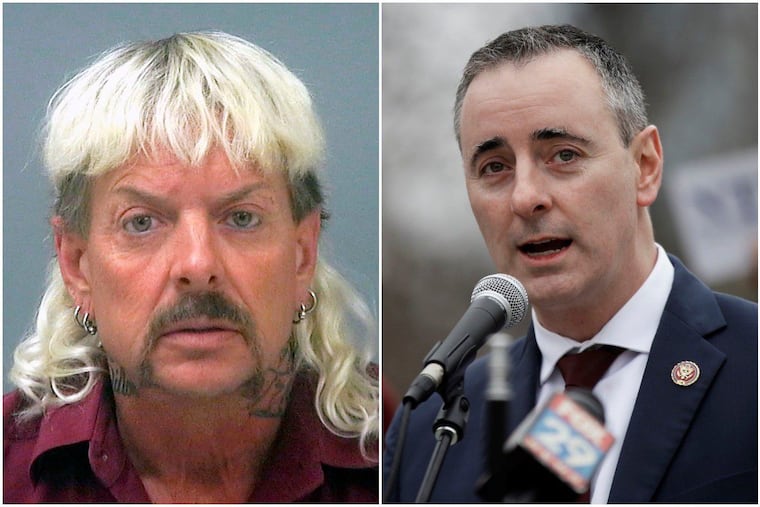U.S. Rep. Brian Fitzpatrick wrestles the Tiger King
It’s Fitzpatrick v. Joe Exotic. Plus, a state rep’s alleged attempt to shake down Wawa and a legal-defense fund for Councilmember Kenyatta Johnson.

While Clout only recently learned about the exotic big cat trade and the eccentric (allegedly abusive) owners profiting, U.S. Rep. Brian Fitzpatrick has been a foe of Joe Exotic for years.
Fitzpatrick, a Republican who represents Bucks County, is a lead cosponsor of the Big Cat Public Safety Act, which would ban the private ownership of lions, leopards, tigers, and related species. It would also ban circuses and zoos from allowing direct contact with cubs, such as petting or feeding. There are currently more tigers in captivity in the United States than in the wild.
Fitzpatrick told us he first became aware of tiger trading and cub breeding as an FBI agent more than a decade ago.
“I did a lot of international travel and saw the nexus of how the tiger trade was linked with organized crime, financed arms trades, drug trades," he said.
The bill has languished since being introduced last year, but Fitzpatrick said he’s been inundated with calls since the documentary Tiger King aired on Netflix. The seven-part series features Joseph Maldonado-Passage, a.k.a. Joe Exotic, a country singer, onetime presidential candidate, and owner of hundreds of big cats.
“We’ve had such a hard time getting the public’s attention,” Fitzpatrick said. “Now, every day, it’s Tiger King or coronavirus.”
Sounds like our lives, too.
Fitzpatrick said the easiest way to move the bill forward is to get 290 cosponsors, which would trigger a full House vote. He’s at 227, including 12 of Pennsylvania’s 18 representatives.
The six who have not signed on are Republicans Daniel Meuser, Scott Perry, Fred Keller, John Joyce, Glenn Thompson, and Mike Kelly.
Pennsylvania’s senators — Democrat Bob Casey and Republican Pat Toomey — have not signed on as sponsors to a companion bill in their chamber.
“We are grateful that twelve bipartisan members of Pennsylvania’s U.S. House delegation have cosponsored,” the Humane Society said. “Given the abuses shown in Tiger King, we hope all Pennsylvania members will be motivated to cosponsor.”
Tiger ownership and breeding is currently regulated by states. Some ban it outright, like New Jersey. Others have strict permitting requirements, like Pennsylvania, and some are the “wild west,” Fitzpatrick said.
The bill would protect both animals and people, advocates argue. In 2011, a 450-pound Bengal tiger attacked a woman at Lake Tobias Wildlife Park in Dauphin County when she stuck her arm into its cage.
Fitzpatrick has not met one of the bill’s most public backers, Carole Baskin, a tiger sanctuary owner who is also not-so-subtly accused in the Netflix series of murdering her husband and feeding him to the tigers.
“I haven’t finished the show," Fitzpatrick said. "I haven’t seen how the Carole story ends yet.”
State Rep. Brian Sims to Wawa: Show me the money!
Sequestered at home, Clout finally got around to reading the 101-page “final adjudication” from the State Ethics Commission, released in March after a nearly three-year investigation of State Rep. Brian Sims, a Philadelphia Democrat.
Long story short: The commission fined Sims $750 for technical violations after he failed to report income from a speaking engagement and his membership on a board. Sims was cleared of more serious allegations that he improperly solicited speaker fees and used his state staff to arrange those events.
The report details a dispute Sims had in 2015 with Wawa, which gave him his first job as a teenager, after the company asked him to lead an LGBT diversity training class in 2015.
A Wawa executive, in an email, complained about Sims proposing a $6,000 fee for the training. “Frankly, we have never been charged to have one of our representatives come to talk to us so this is very new to us,” the executive wrote. She doubled down in a follow-up, writing she had “never heard of a current ‘public servant’ charging.”
Sims was not having it, according to the report, writing in an email to an intermediary: “This is bull----. I don’t represent Wawa. I represent Center City Philadelphia. A place, I might add, that they all have pulled out of about five years ago …"
Wawa, we should note, has since returned to Center City, opening several stores.
Sims, the General Assembly’s first openly gay legislator, said his diversity training work is no different from House colleagues who also have law practices or work as accountants. He told Clout he once again has a good working relationship with Wawa, which eventually paid him $2,500.
“They came around to it," he said. "And I’m glad they did. It was a really good training.”
Kenyatta Johnson fund-raising for criminal case
City Councilmember Kenyatta Johnson is asking for donations to pay his legal bills. He was indicted Jan. 29 with his wife, Dawn Chavous, accused of accepting more than $66,000 in bribes from Universal Companies, a nonprofit that operates in his district.
Johnson’s legal team reached out to the city’s Board of Ethics five days before the indictment was announced for advice on setting up a legal-defense fund. They were told it would be inappropriate to funnel donations through his political action committee, since the indictment did not involve his campaigning.
Instead, Johnson will list contributions on his annual statement of financial interests. That report for 2020 will not be made public until May 2021.
Johnson’s defense team said the fund will not cover his wife’s legal bills. Chavous’ lawyer said she does not have a legal-defense fund. Their trial is set for January.
Fighting a federal indictment is expensive. The city reported spending about $189,000 for attorneys to represent Johnson before the indictment. The city stopped paying when it was returned.